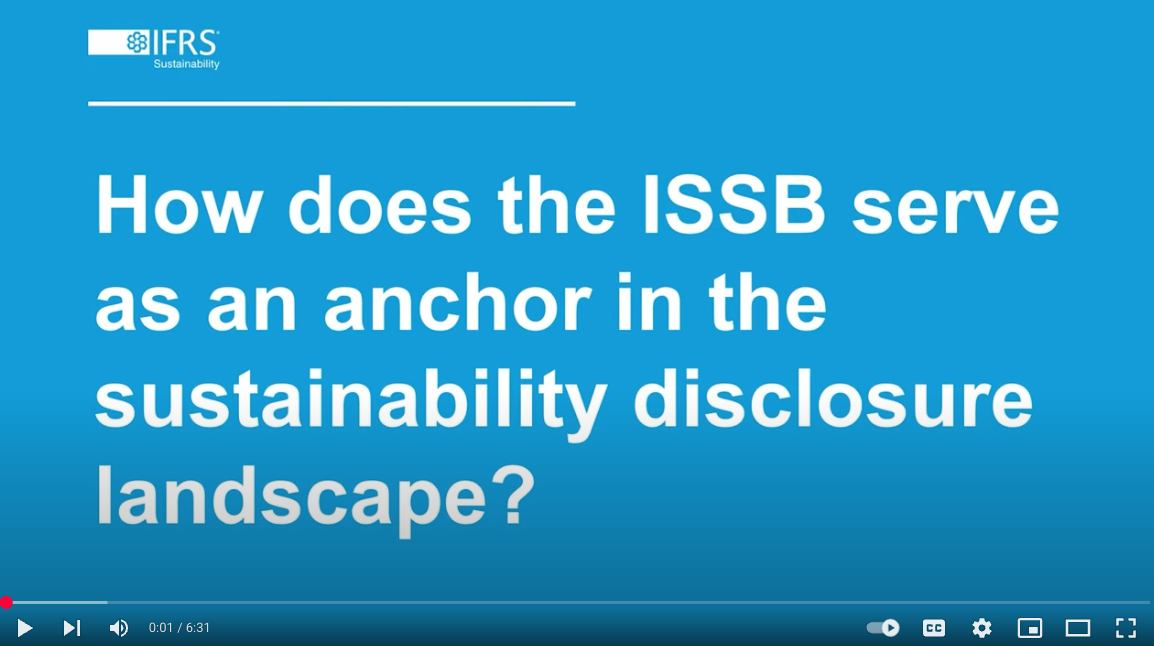Will a global baseline of sustainability disclosures be our light in the fog?
Jan 30, 2025
As politics and ideology whip up the headwinds facing corporate sustainability reporting, it may be helpful to hone in on those ‘bare minimum’ disclosure practices that can help sustainability practitioners cut through the turbulence and uncertainty — including the global baseline of sustainability-related financial disclosures provided by the IFRS SDS.
Over the last few weeks, the political, policy, and regulatory backlash on anything related to sustainability and ESG has been dizzying — and disconcerting to anyone in this space (as you probably are, having clicked through to read this).
The ramifications of the multiple US presidential executive orders, staff firings, threats of legal proceedings, and hijacking of federal funds to blackmail States and organizations to fall in line with the Trump administration’s agenda will take a long time to comprehend, and then hopefully respond to.
Similarly in the European Union, what started out last November as mere ‘simplification’ measures to streamline the implementation of key regulations such as the Corporate Sustainability Reporting Directive (CSRD), the Corporate Sustainability Due Diligence Directive, and the EU Taxonomy has devolved into what are likely to be significant scale-backs, amidst calls for their full-fledged suppression. We’ll know more on 26 February when details of the ‘Omnibus Simplification Package’ will be announced.
The headwinds facing the corporate sustainability reporting space stem from a combination of governance failures, political ideology, peer pressure, fear of change, and the unshakable grip of those in power on profit supremacy. One thing’s for certain, the next several months will be turbulent ones. Lots of uncertainty, and lots of noise.
In trying to figure out what might help provide some clarity and guidance to corporate sustainability reporting practitioners in their day-to-day, I keep coming back to the concept of ‘bare minimum’ or ‘baseline’ — in other words, the priorities and behaviours that have become so ingrained as to survive these headwinds.
The bare minimum of sustainability disclosures
One such bare minimum is climate change. Despite Trump’s declarations, heaven knows there’s enough science, and there is probably enough conviction across the globe to continue efforts to limit global warming in line with the objectives of the Paris Agreement (even though we’ve likely permanently blown through 1.5C already) and accelerate efforts to reduce harmful GHG emissions. Disclosures being a mechanism of accountability to others, it stands to reason that climate disclosures will continue to take hold, becoming not only mandatory but also standardized, audited, and digitized in order to make disclosures useful to those who need them.
Another bare minimum is financial materiality, or a financial performance-centric focus. Whatever makes businesses better at managing risks and improving their profitability and cash flows remains consistent with current system dynamics, and it gets the attention of management and investors alike. Disclosures being a mechanism to ensure capital market efficiency and optimize market valuations, it’s reasonable to expect that disclosures intended to meet the information needs of investors and other capital providers will also continue to take hold, especially in the form of general purpose financial reports that include financial statements, sustainability reporting, and a management commentary.
That global baseline
Which brings me to the IFRS Foundation’s Sustainability Disclosure Standards. When the IFRS Foundation created the International Sustainability Standards Board (ISSB) in November 2021, it set out to create, in its own words, a global baseline of sustainability-related financial disclosures. It’s difficult to know whether the ISSB was being prescient or simply cautious, but that’s a moot point.
“The ISSB is working with key players in the sustainability disclosure landscape to deliver an efficient reporting landscape, as a global baseline of sustainability-related financial disclosures is established through use of the ISSB Standards.”
Initially, the idea was to create capital market-centric reporting standards that could be bonified and expanded by individual jurisdictions to meet their specific policy goals. These days, it might just be about moving in the direction of identifying, managing, and disclosing on sustainability-related ‘sustainability-related risks and opportunities that could reasonably be expected to affect an entity’s prospects’.
Last November, the IFRS Foundation published an analysis on Jurisdictional progress towards the adoption or other use of ISSB Standards, highlighting that 30 jurisdictions around the world were in the process of ‘adopting or otherwise using’ the IFRS Sustainability Disclosure Standards. These jurisdictions represent approximately 75% of capital markets excluding the US. Of note:
- 29 of these jurisdictions had finalized requirements or published proposals on climate-related disclosures, including Scope 3 greenhouse gas emission disclosure requirements
- 28 of the 30 jurisdictions have included or are considering requirements for industry-specific disclosures (a.k.a. applying SASB Standards)
- 27 of the 30 jurisdictions have included or are considering requirements for disclosure covering all sustainability-related risks and opportunities over time, not just climate change
The anticipated regulatory uptake of these standards aims to increase the quality and comparability of climate and ultimately all sustainability-related disclosures to better meet investors’ information needs.
“The strong jurisdictional progress towards the introduction of sustainability-related disclosure requirements by adopting or otherwise using ISSB Standards and the shift from recommended to mandated disclosures should result in an increase in the availability of robust, material sustainability-related information for use in global capital markets.”
The mainstream adoption of the IFRS SDS may become a lifeboat, so to speak, for reporting practitioners working in the fog that's once descending on the corporate sustainability reporting landscape. Practitioners will have to move more slowly, but move nonetheless.




